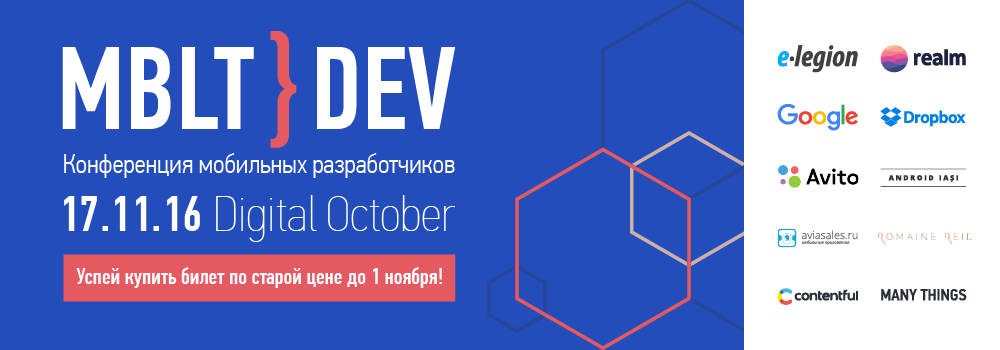The preliminary program of the MBLTdev 16 mobile developers conference has been published.

The conference will be held on November 17 in Moscow in Digital October. For the first time, the business program will be held in 4 streams to accommodate hardcore reports, live coding and workshops for mid + mobile developers, as well as a UX / UI track for mobile designers. The preliminary program of the event is published on the MBLTdev website . The schedule will be gradually supplemented by new performances, stay tuned.
17 speakers - foreign and Russian specialists from international food and service companies have already confirmed their participation. .
')
Bogo Jirtler, developer, Dropbox
At Dropbox, we are focused on creating a robust and easy-to-test architecture that reliably stores our users' information, learns quickly and requires minimal maintenance. At MBLTdev 16 I’ll give a talk on “Architecting for the Win” and tell you how Dropbox makes complex decisions within Swift and Objective-C through consistently designed data exchange. It doesn't matter if you work with MVVM, MVC, Rx or others, the presentation will definitely be useful for developers who want to create a solid architecture for working with an abundance of data that must be shared.
Keith Moon, Lead iOS Developer, Just Eat
He will give a talk “Thinking in Swift” and help developers who actively use Objective-C to comfortably switch to Swift 3. He will talk about the strengths of the language: about the type system, working with structures and classes, protocols and generics. He will teach you to prevent typical mistakes, show features of testing.
Mario Bodemann, Android and Java Evangelist, Contentful
At MBLTdev, Mario will talk about Google Cardboard and Daydream SDK in Java, how to use them, what chips they offer to developers, and also show everything with an example that can only be obtained using the VR SDK.
Daniel Hate, iOS indie developer, Many Things
Daniel will make a presentation on “AsynConcurrency” and his main points:
- Improving the readability of the code through the competent organization of callbacks,
- Ensuring the consistency of the stored data using access synchronization,
- Processing dependencies asynchronous methods,
- Work with data that does not yet exist when creating interfaces.
Andri Dikonu, co-founder, Android Iasi
Let's compare cloud testing technologies using the best practices as an example - all from the point of view of a developer, not a tester. The Android ecosystem is very fragmented, all devices have different screens. It seems that it is impossible to conduct testing at all at once. But if we write automated tests, we will be able to run them on hundreds of real devices in the cloud. Let's compare Expresso with Appium and Amazon Device Farm with Firebase Device Lab and see which ones we like more.
Evgeny Shishkin, Android developer, Aviasales
Google recommends using snippets to build a flexible UI. In cases when we need to optimize the interface for tablets or implement the work with ViewPager, this is really the simplest solution. At the same time, the integration of fragments is not such an easy task. Anyone who has ever seen a diagram of their life cycle understands the seriousness of what has been said. Potential memory leaks, complex APIs and bugs (the number of questions on StackOverflow exceeds 100,000). And all this no longer seems such a good decision. Let's discuss what are the alternatives.
Dmitry Kostyrev, Android Lead Developer, Avito
My report on MBLTdev will be devoted to Robolectric, a framework for running tests on a local Android-specific JVM. We will look under the hood of this tool and find out its internal structure in detail, examine the existing Shadow implementations and write our own. We also estimate the performance of the Robolectric compared to alternative solutions.
Dmitry Obukhov, macOS and iOS developer at Realm and co-founder of CocoaHeads Moscow
The report on MBLTdev 16 will be about how to build applications on the Realm Mobile Platform. I will also tell you how to use it in already existing applications, about various features and nontrivial scenarios. There will be many examples.
Alexey Lavrenyuk, Load Testing Service Engineer, Yandex
On MBLTdev 16, I’ll tell you how we are measuring the performance of mobile applications in Yandex: which metrics and how we collect, how we run test scripts, what our reports look like. And there will be another great story about how we drilled the iPhone in order to measure the current consumption of the battery.
You can get acquainted with the other speakers and topics of their reports on the site .
Please note that from November 1, the ticket price will rise to 7,500 rubles. Hurry up to buy a ticket now on the official website of MBLTdev 16.
Conference organizers: e-Legion and RAEC.
Partners: Google, Aviasales, Avito, British High School of Design
Source: https://habr.com/ru/post/312314/
All Articles